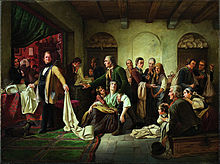
Silesian weavers' uprising of 1844 (German: Schlesischer Weberaufstand) was a revolt against contractors who supplied the weavers of Silesia with raw material and gave them orders for finished textiles but drastically reduced their payments.
Silesia's industry was in bad condition in the decades after 1815. Silesian linen weavers suffered under Prussia's free trade policy and British competitors that already used machines destroyed the competitiveness of Silesian linen. The situation worsened after Russia imposed an import embargo and the Silesian linen industry began to mechanize. In several towns this traditional craft died out altogether, costing many linen weavers their profession.
As social conditions worsened, growing unrest culminated in the Silesian cotton weavers' uprising of 1844. This uprising, on the eve of the revolution of 1848, was closely observed by German society and treated by several artists, among them Heinrich Heine (with his 1844 poem Die schlesischen Weber) and Gerhart Hauptmann (with his 1892 play The Weavers). It also attracted extensive attention among German thinkers such as Karl Marx.